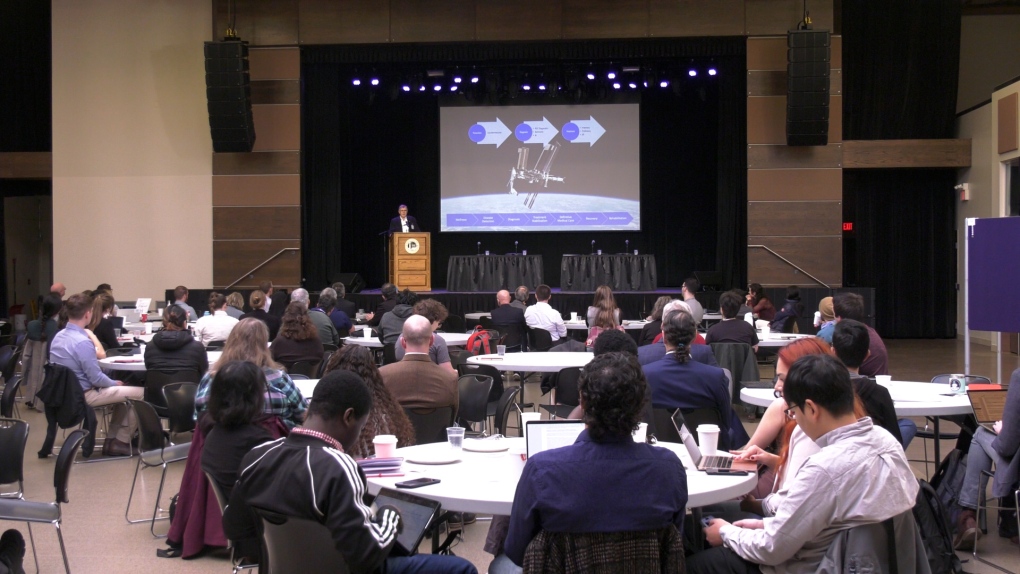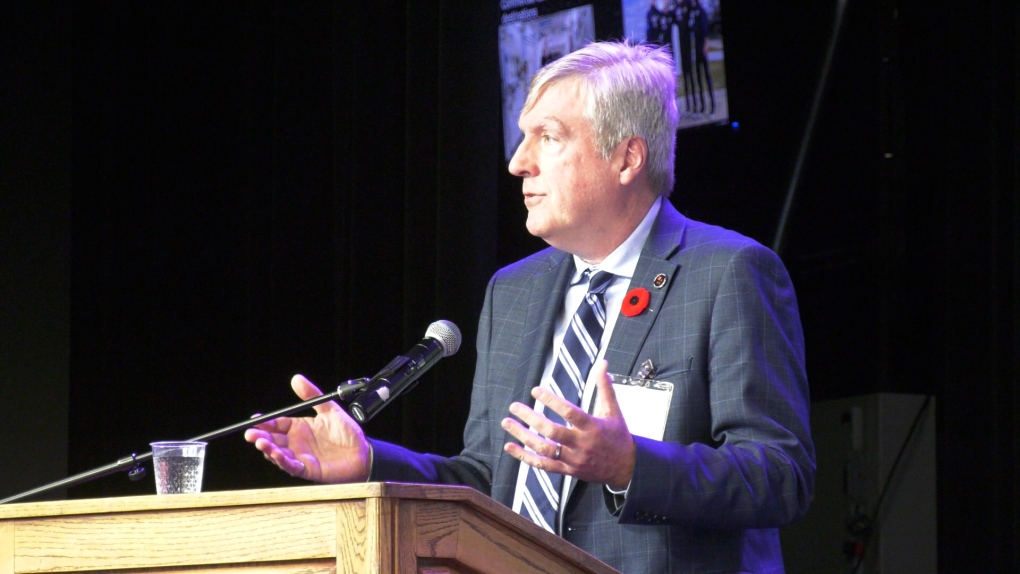'It's really hard to keep people healthy and alive in space': Western University symposium promotes work in space health
Facing the challenges of staying healthy in space, Western University in London, On. is hosting a three-day symposium designed to help do just that.
As NASA prepares for a return to the Moon and talks continue about going to Mars, one of the focuses is on maintaining the physical and mental health of astronauts on longer missions.
Sarah Gallagher is a professor in Western’s Department of Physics and Astronomy. She is also co-chair of this year's Canadian Space Health Research Symposium taking place on the Western campus, "You need to bring together experts from all different fields - from engineering or medicine and molecular biology and psychology - in order to think about what you need to do and how you can keep people healthy and live in a very low resource, extremely isolated, confined environment."
Researchers have come from across Canada and around the world to share ideas designed to improve the health and safety of astronauts.
While most people in Canada have relatively easy access to health care, distance can be a complicating factor - it's the same in space. The International Space Station (ISS) is only about 400km above sea level. Gallagher said illness on the ISS is less of a challenge than illness on the longer journeys being considered, "It's really hard to keep people healthy and alive in space. And those challenges just get even greater as you go farther away; as you go beyond low-earth orbit to the Moon and eventually to Mars."
Dr. Dave Williams is a retired Canadian Space Agency (CSA) astronaut, "We're now talking about medical autonomy, developing a technology, the capabilities to be able to take care of people and deliver sophisticated medical care in these remote environments." Researchers looking at health issues in space gather at Western University (Gerry Dewan/CTV News London)
Researchers looking at health issues in space gather at Western University (Gerry Dewan/CTV News London)
While most people in Canada have relatively easy access to health care, distance can be a complicating factor - it's the same in space. The International Space Station (ISS) is only about 400km above sea level. Gallagher said illness on the ISS is less of a challenge than illness on the longer journeys being considered, "It's really hard to keep people healthy and alive in space. And those challenges just get even greater as you go farther away; as you go beyond low-earth orbit to the Moon and eventually to Mars."
Dr. Dave Williams is a retired Canadian Space Agency (CSA) astronaut, "We're now talking about medical autonomy, developing a technology, the capabilities to be able to take care of people and deliver sophisticated medical care in these remote environments."
Williams was a mission specialist on two space shuttle missions and was the first non-American to hold a senior management position within NASA. He's had an extensive medical career, including time as an emergency room physician. He believes Canada has a unique perspective on remote medicine, "I think the clinical capability that we have in northern Canada could be looked at as an analog for space medicine research."
Canadian Space Agency acting director Mathieu Caron said Canada bolstered its reputation in robotics with the Canadarm and could now play a significant role in space health research – benefitting not only the space program but also many young Canadians.
 Canadian Space Agency acting director Mathieu Caron addresses Canadian Space Health Research Symposium at Western University.(Gerry Dewan/CTV News London)
Canadian Space Agency acting director Mathieu Caron addresses Canadian Space Health Research Symposium at Western University.(Gerry Dewan/CTV News London)
He pointed to London-native Jeremy Hanson, who is set to become the first non-American to circle the moon during next year's NASA Artemis 2 mission. Caron told CTV News, "The astronauts have a huge inspirational factor that can serve as a catalyst for further research and development activities. But also to encourage the younger generation to go into STEM [Science, Technology, Engineering, Math]... to the benefit of Canada as a whole."
One of the more interesting research paths presented at the symposium came from teams out of Western University and Michigan Technical University who were working together. Their paper looks at converting asteroids into food. According to Sarah Gallagher, “You can't do the groceries for three years of food. You need to be able to produce it while you're traveling. So, it's kind of a crazy idea making food from asteroids - but it turns out they have carbon, that, you know, that most of our food is made up of."
The symposium wraps up on Friday.
CTVNews.ca Top Stories

W5 Investigates A 'ticking time bomb': Inside Syria's toughest prison holding accused high-ranking ISIS members
In the last of a three-part investigation, W5's Avery Haines was given rare access to a Syrian prison, where thousands of accused high-ranking ISIS members are being held.
'Mayday!': New details emerge after Boeing plane makes emergency landing at Mirabel airport
New details suggest that there were communication issues between the pilots of a charter flight and the control tower at Montreal's Mirabel airport when a Boeing 737 made an emergency landing on Wednesday.
BREAKING Supreme Court affirms constitutionality of B.C. law on opioid health costs recovery
Canada's top court has affirmed the constitutionality of a law that would allow British Columbia to pursue a class-action lawsuit against opioid providers on behalf of other provinces, the territories and the federal government.
Cucumbers sold in Ontario, other provinces recalled over possible salmonella contamination
A U.S. company is recalling cucumbers sold in Ontario and other Canadian provinces due to possible salmonella contamination.
Irregular sleep patterns may raise risk of heart attack and stroke, study suggests
Sleeping and waking up at different times is associated with an increased risk of heart attack and stroke, even for people who get the recommended amount of sleep, according to new research.
Real GDP per capita declines for 6th consecutive quarter, household savings rise
Statistics Canada says the economy grew at an annualized pace of one per cent during the third quarter, in line with economists' expectations.
Nick Cannon says he's seeking help for narcissistic personality disorder
Nick Cannon has spoken out about his recent diagnosis of narcissistic personality disorder, saying 'I need help.'
California man who went missing for 25 years found after sister sees his picture in the news
It’s a Thanksgiving miracle for one California family after a man who went missing in 1999 was found 25 years later when his sister saw a photo of him in an online article, authorities said.
As Australia bans social media for children, Quebec is paying close attention
As Australia moves to ban social media for children under 16, Quebec is debating whether to follow suit.


































